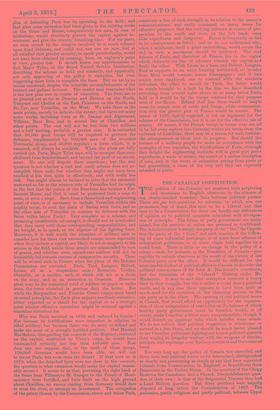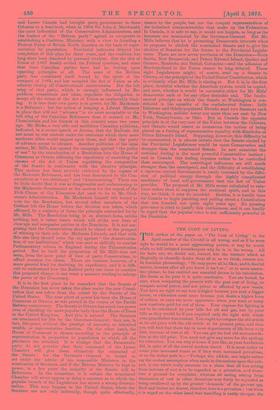THE CANADIAN CONSTITUTION.
THE politics of the Colonies are rendered both perplexing and wearisome to English observers by the absence of any clearly-marked boundary lines between political parties. There are "no test-questions by reference to which you can pronounce, out of hand, this man to be a Liberal and that man to be a Conservative, for there are hardly any differences of opinion as to political measures coincident with divergen- cies of principle. The forms of party government are main- tained, but the motives of action are personal or traditional. The Administration is simply the party of the " Ins," the Opposi- tion the party of the " Outs," and each consists of the follow- ing of some influential personage, or of some loose alliance of independent politicians, or of some clique held together by a social bond. There is little or no change in the policy of a colony—such, for instance, as the Dominion of Canada—per- ceptible by outside observers as the result of the victory of one Colonial party over the other. It would be difficult for the most careful student of political affairs in Canada to describe the political consequences of Sir John A. Macdonald's overthrow, and the formation of the " Liberal " Ministry under Mr. Mackenzie. It may be said that corruption received a heavy blow in that struggle, but this is rather a social than a political result, and in any case there appears to have been quite as much need for the operation of the cleansing process in the one party as in the other. The opening of real political issues in Canada, that would afford an opportunity for the organisa- tion of those antagonisms of conviction on the balance of which healthy party government must be founded, would, at all events, make Canadian politics more comprehensible, though it would disturb an apparent calm which satisfies some minds. We do not believe that political stagnation is wholesome or natural in a free State, and we should be much better pleased to see Canadian politicians fighting-out honest political quarrels than waging an irregular warfare with the weapons of slander, intrigue, and espionage over Railway contracts and Government loans.
Not very long ago the policy of Canada was unsettled, and there were real political issues to be determined, distinguished as clearly and penetrating as deeply as any that have separated Liberals from Conservatives in England, or Republicans from Democrats in the United States. In the question of the Clergy Reserves the Canadians had a Church Disestablishment ques- tion of their own ; in that of the Seigniorial Tenures they had a Land Reform question. But these problems were happily disposed of long before the Confederation of 1867. The jealousies, partly religious and partly political, between Upper
and Lower Canada had brought party government in those Colonies to a dead-lock, when in 1864 Sir John A. Macdonald, the-most influential of the Conservative Administration, and the leaders of the " Reform party " agreed to co-operate in establishing a Coalition Ministry, with a view to founding a Federal Union of British North America on the basis of repre- sentation by population. Provincial jealousies delayed the completion of this plan for three years, and the coalition has long since been dissolved by personal rivalries. But the Act of Union of 1867 finally settled the Federal question, and since that• time Canadian parties have had no footing upon opposing principles at all. The mass of the Reform party has considered itself bound by the spirit of the compact of 1864, and has accepted the Act of Union as ab- solutely closing all Constitutional controversies. But the left wing of that party, which is strongly influenced by Re- publican connections and ideas, repudiate the obligation to accept all the terms of the Act of Union as unalterably bind- ing. It is true their own party is in power, for Mr. Mackenzie is a Reformer ; but the notion of keeping a Liberal Ministry in place that will not " advance " is no more acceptable to the left wing of the Canadian Reformers than it seemed to Mr. Chamberlain and his friends in this country some two years -ago. Mr. Blake, a very able and ambitious Canadian politician, indicated, in a recent speech at Aurora, that the Radicals did not mean to rest content under the restraints which their more moderate allies• would impose upon them, and that the party of advance meant to advanee. Another politician of the same section, Mr. Mills, has opened the campaign against " the policy of rest" by the introduction of a Resolution into the House of Commons at Ottawa affirming the expediency of amending the clauses of the Act of Union regulating the composition of the Senate in conformity with the elective principle. This motion has been severely criticised by the organs of the Moderate Reformers, and has been denounced by the Con- servatives as "revolutionary" and "Americanising." There can be little doubt that it was as disagreeable and embarrassing to the Mackenzie Government as the motion for the repeal of the 25th Clause of the Education Aet used to be to Mr. Glad- stone's Administration. Mr. Mackenzie himself felt bound to vote for the Resolution, but several other members of the Cabinet left the House before the division was taken, which affirmed, by a majority of three, the principle contended for by Mr. Mills. The Resolution being in an abstract form, settles nothing, but it raises issues which will strike new lines of -cleavage and reorganise parties in the Dominion. It is not sur- prising that the Conservatives should be elated at the prospect of winning to their side the Moderate Liberals, and that with this aim they should raise the cry against " the Americanisa- tion of our institutions," which was used so skilfully to combat Parliamentary reform in England during the Palmerstonian period. But in itself the proposition of Mr. Mills does not seem, from the mere point of view of party Conservatism, to afford occasion for alarm. There are reasons, however, of a more general kind for doubting its expediency, and it is diffi- cult to understand how the Radical party can come to consider this proposed change in any sense a measure tending to enlarge the power of the Democracy.
It is in the first place to be remarked that the Senate of the Dominion has never taken the place under the new Consti- tation that was taken from the outset by the Senate of the United States. The true pivot of power has been the House of Commons at Ottawa, as was proved in the course of the Pacific Railway controversy. The Senate at Ottawa has much less power even of checking the more popular body than the House of Peers in the United Kingdom. And this is natural. The Senators are nominated for life by the Governor-General ; they are, in feet, life-peers, without the prestige of ancestry, or inherited wealth, or representative function. On the other hand, the House of Commons is chosen according to the principle of representation in proportion to population to which all the provinces are attached. It is strange that the Democratic party do not perceive that their command of the Lower Chamber will give them ultimately the command of the Senate ; for the Governor - General is bound to act under the advice of his responsible Ministers in the nomination of Senators, and if the Reform Ministry be kept in power, in a few years the majority of the Senate will be Reformers. In the meantime, it is certain the nominated Chamber will never oppose or delay a measure as to which the popular branch of the Legislature has shown a strong determi- nation. This may happen in the United States, where the Senators are not only indirectly, though quite effectually,
chosen- by the people, but are the coequal representatives of the indistinct commonwealths- that make up the Federation: In Canada, it is safir to say, it would not happen, so long as the Senators are nominated by the Governor-General. But Mr. Mills believes that he is promoting Democratic interests when he proposes to abolish the nominated Senate and to give the election of Senators for the future to the Provincial Legisla- tures. There are now seven provinces of the Dominion-,---Nova Scotia, New Brunswick and Prince Edward Island, Quebec and Ontario, Manitoba and British Columbia—and the adhesion of Newfoundland to the Union cannot be long delayed, These eight Legislatures might, of course, send up a Senate to Ottawa, on the principle-of the United States' Constitution, which is evidently what Mr. Mills is aiming at. But it is in the first place, doubtful whether the American system could be copied, and next, whether it would be successful either for Mr. Mills' democratic ends or for any-other desirable end. The funda- mental principle on which the Senate at Washington is con- stituted is the equality of the confederated States ; little Delaware and thinly-populated Nevada send two Senators each to Washington, neither fewer nor more than are sent by New York, Pennsylvania, or Ohio. But in Canada the opposite principle is at the very root of the Union between: the Colonies, and Ontario would resent as monstrous the notion of being placed on a footing of representative equality with Manitoba or Prince Edward's Island. Supposing, however, this difficulty W be surmounted, it is almost certain that the Senate elected by the Provincial Legislatures would be• more Conservative and stronger than the nominated Senate. In new countries the sectional feeling is the most powerful Conservative instinct ; and in Canada this feeling requires rather to be controlled than encouraged. The centrifugal influences are still much stronger than the centripetal, and the difficulty of establishing a vigorous central Government is vastly increased by the diffrt-, sion of political energy through the highly complicated` machinery of local self-government that the Act of Cairn! provides. The proposal of Mr. Mills seems calculated to rein- force rather than to suppress the sectional spirit, and in this way, we think, it may do mischief. Besides, it is•hardly time for Canada to begin patching and pulling about a Constitution that was founded not quite eight years ago. No pressing grievance is cited to justify this restlessness, and it can hardly be urged that the popular voice is not sufficiently powerful in the Dominion.



































 Previous page
Previous page